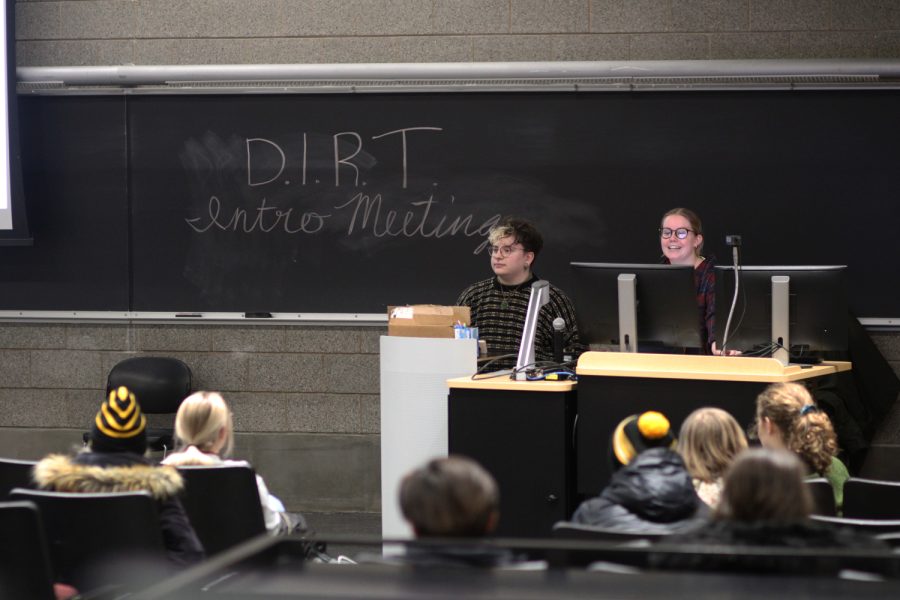UI student gardens to open after years of fundraising
The small gardens, which will be planted on the east side of campus, will reduce the university’s carbon footprint and serve as a learning opportunity for students.
Members of the University of Iowa’s gardening club, D.I.R.T., conduct their introductory meeting on Tuesday, Jan. 31, 2023.
February 5, 2023
The University of Iowa student organization Determined Growers Incorporating Radical Farming will begin planting its on-campus Edible Gardens this spring. The gardens are being planted after several years of planning and fundraising.
The Edible Gardens will be made up of four small locations by the Chemistry Building and North Hall along the east side of the UI campus.
Esmee Belzer, co-president of DIRT, said the garden near North Hall will have major vegetable production in addition to hammock poles and a raised bed.
The plots around the Chemistry Building are in the southwest — where crabapple trees currently stand — and northwest corners, Belzer said.
Belzer said a major part of DIRT’s activities involve deciding what to plant in the gardens.
Belzer joined the organization her freshman year and said fundraising was in progress for another larger garden on campus when she started. At the time, the plan was to create a large garden between the river and North Hall.
Once the university’s strategic plan allocated the space, she said the organization focused on finding funding for the two phases of the garden for its main construction and beautification. The main construction phase was estimated to cost approximately $100,000.
The strategic plan changed, however, and the space allocated for the student gardens was reallocated for future Iowa Memorial Union expansion.
“Our initial idea was started to do sort of like guerilla gardening, where we just sort of plant like a tomato here, a raspberry bush there, and just kind of say screw it to the large garden idea, like little pockets and gardens all over the place,” Belzer said.
The Edible Gardens were made possible with a $25,000 Wellmark Grant in addition to funds from UI Undergraduate Student Government and donors, she said.
While in the process of figuring out what to plant, DIRT reached out to Fred Meyer, a UI adjunct professor and founder of the local nonprofit Backyard Abundance.
Meyer said he helped the group decide where to place the gardens.
“We went on a tour of potential places where they were planning on establishing some environmentally friendly landscapes, and I just gave him some advice on what might work well in those areas,” Meyer said.
Meyer said the two main criteria for determining what plants work well in an area are the people who will be interacting with the space and the strengths and weaknesses of the landscape.
RELATED: UI College of Public Health, College of Education adopt sustainability requirement
Director of the Office of Sustainability Stratis Giannakouros said the gardens’ locations were picked based on the traffic patterns of students. He said the locations for the garden were narrowed down by several criteria:
- Eliminating areas previously reserved and considered a critical one area — such as the Pentacrest — that are important aesthetically to the UI for recruiting prospective students
- Accessibility in location for students
- Where prospective students are likely to walk on a tour
At the UI, student gardens have been a staple but have been located off the main campus. Edible Gardens will be the first to have a home on the east side of the river, which Giannakouros said will fulfill many people’s wishes.
“There’s been this desire on the part of students on campus for a long time to have a student garden that is on campus,” he said. “So, these are areas that people might walk by, and we can have signage that says hey, we value, you know, being a Bee Campus and gardening.”
Giannakouros said the Edible Gardens on campus will help the UI meet the requirements of the Bee Campus USA designation achieved in 2022. To qualify as a Bee Campus, a university must have pollinator-friendly spaces, reduced pesticide use, have a campus and advisory committee, and increase biodiversity on campus.
The cost of the project is currently unknown, but Giannakouros said he expects it to be minimal.
Adding biodiversity was a main reason behind coining the term “Edible Gardens” for the project, Giannakouros said.
“There’s certain things you can put in that help promote certain insects, that control the insects, that we don’t want eating vegetables,” he said.



